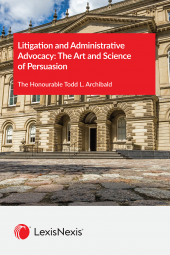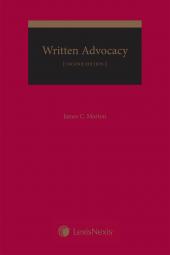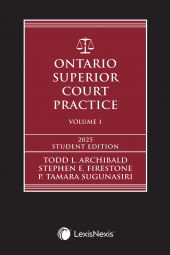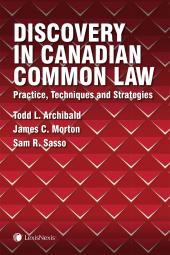Discovery in Canadian Common Law: Practice, Techniques and Strategies + E-Book PDF
One Year Subscription Only Terms
Subscribers receive the product(s) listed on the Order Form and any Updates made available during the annual subscription period. Shipping and handling fees are not included in the annual price.
Subscribers are advised of the number of Updates that were made to the particular publication the prior year. The number of Updates may vary due to developments in the law and other publishing issues, but subscribers may use this as a rough estimate of future shipments. Subscribers may call Customer Support at 800-833-9844 for additional information.
Subscribers may cancel this subscription by: calling Customer Support at 800-833-9844; emailing customer.support@lexisnexis.com; or returning the invoice marked 'CANCEL'.
If subscribers cancel within 30 days after the product is ordered or received and return the product at their expense, then they will receive a full credit of the price for the annual subscription.
If subscribers cancel between 31 and 60 days after the invoice date and return the product at their expense, then they will receive a 5/6th credit of the price for the annual subscription. No credit will be given for cancellations more than 60 days after the invoice date. To receive any credit, subscriber must return all product(s) shipped during the year at their expense within the applicable cancellation period listed above.
Détails des produits
“A practical text with valuable examples on how to prepare for and execute a discovery, Discovery in Canadian Common Law: Practice, Techniques and Strategies would be a welcome addition to any library collection. The book is easy to read and offers a plain language discussion relating to the purpose of discovery and techniques to achieve the best outcome from the discovery process. Librarians, novice, and even more experienced practitioners will appreciate this text; it is a must-have for any litigation practice collection.”
Reviewed by Laura Lemmens, BA BEd MLIS
Acting Head, Library and Open Information
Alberta Government Library – Capital Boulevard
Edmonton, Alberta
See Review in Canadian Law Library Review 43:2
Employ the right techniques to obtain the information that will make, or break, the case.
Discovery is a central element of civil litigation in Canada. It's a mechanism to enable all parties to know the case that they have to meet, prepare for trial or resolve their disputes by an informed settlement. Discovery in Canadian Common Law: Practice, Techniques and Strategies covers the principles of discovery, ethical and practice issues, and techniques and tactics to be deployed.
Features
- Authoritative guidance from experienced civil litigators – Clear, concise and time-saving advice from 3 experts on every step of the discovery process
- Covers all aspects and forms of discovery – A one-stop-shop for what you need
- Up-to-date discussion reflecting latest eDiscovery practices – Be on top of the latest technological tools used in discovery practices
- Covers all common law jurisdictions – One reference for multiple jurisdictions
Highlights
17 chapters cover a wide-range of topics on this subject, including:
- The Importance of Discovery in Canada
- Scope of Discovery
- Limitations on Solicitor-Client Privilege
- Process of Documentary Discovery
- Discovery Plan
- Costs of Discovery
- Witness Preparation
- Scope of Questions on Written Interrogatories
- Jurisdiction to Order Inspection
- Right to an Examination
- E-discovery Tools and Processes
- Putting the Implied Undertaking Into Practice
- Evidentiary Basis for Use of Discovery
- Tips for Counsel Accompanying a Witness
- The Importance of Introductory Questions
- Principles for a Productive Discovery
At the end of discovery, counsel should be in an ideal position to assist in educating their clients about the probabilities of success or failure at trial.
Who Needs The Book?
- Civil Litigators and law clerks – Every civil litigator needs to do effective discoveries in order to prepare for trial or settlement discussion or negotiations
- Judges – To oversee and determine the appropriateness of the conduct of the discovery process
Table des matières
Chapter 1: Introduction – Principles for a Productive Discovery
Chapter 2: History, Purpose, and Scope of Discovery
Chapter 3: Privilege and Discovery
Chapter 4: Documentary Production
Chapter 5: Discovery Plan
Chapter 6: Examination for Discovery
Chapter 7: Preparing and Examining Witnesses
Chapter 8: Written Interrogatories
Chapter 9: Discovery from Non-Parties
Chapter 10: Inspection of Property
Chapter 11: Medical Examination of the Parties
Chapter 12: E-Discovery
Chapter 13: Confidentiality
Chapter 14: Use of Discovery at Trial
Chapter 15: Examination Practice Tips
Chapter 16: Discovery in Practice
Chapter 17: Summary of Critical Principles
Produits liés
-
 Litigation and Administrative Advocacy: The Art and Science of PersuasionDate de sortie: September 07, 2023140,00 $
Litigation and Administrative Advocacy: The Art and Science of PersuasionDate de sortie: September 07, 2023140,00 $ -
 Written Advocacy, 2nd EditionDate de sortie: May 31, 2013150,00 $
Written Advocacy, 2nd EditionDate de sortie: May 31, 2013150,00 $ -
 Ontario Superior Court Practice, 2025 Edition (Volume 1) + Related Materials (Volume 2) + Key Takeaways for Common Motions Flysheet – Student EditionDate de sortie: October 22, 2024105,00 $
Ontario Superior Court Practice, 2025 Edition (Volume 1) + Related Materials (Volume 2) + Key Takeaways for Common Motions Flysheet – Student EditionDate de sortie: October 22, 2024105,00 $
 Lexis Nexis
Lexis Nexis 